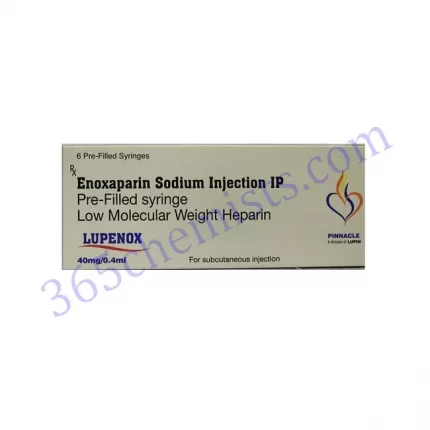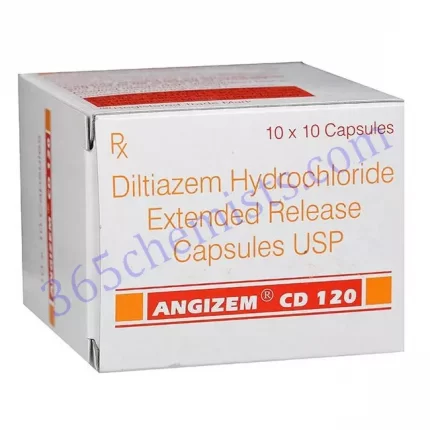Introduction
Enoxaparin is a low molecular weight heparin (LMWH), which is a medication that is commonly used for the treatment and prevention of blood clots. Lupenox 60mg Injection contains this medication. The anticoagulant effects of Lupenox Injection are achieved by inhibiting specific clotting factors in the blood. This results in a decreased likelihood of blood clot formation and the complications that are often associated with it. This article provides a comprehensive overview of the applications, recommended dosage, and safety considerations associated with the use of Lupenox 60mg Injection.
Uses of Lupenox 60mg Injection
- Lupenox Injection is commonly prescribed for the prevention of deep vein thrombosis (also known as DVT). DVT is a condition that is characterised by the formation of blood clots in the deep veins, particularly in the legs. Lupenox Injection can help prevent the formation of blood clots in the deep veins. In order to lessen the likelihood that a clot will form in a patient’s body while they are recovering from orthopaedic surgery, such as the replacement of a hip or knee, it is commonly administered to these patients.
- Deep Vein Thrombosis (DVT) Treatment: When deep vein thrombosis has already developed, the Lupenox Injection is administered as part of the treatment regimen in order to prevent clot extension and lower the risk of pulmonary embolism. It is frequently combined with oral anticoagulants for the purpose of continuing to prevent clot formation and dissolve existing ones.
- Lupenox Injection is also indicated for the prevention of pulmonary embolism, which is a condition in which blood clots travel to the lungs and block the pulmonary arteries. This condition can be prevented by taking the medication. This potentially life-threatening condition can be avoided with the help of Lupenox Injection, which works by lessening the likelihood of clot formation.
- People who have unstable angina or myocardial infarction (also known as a heart attack) may be prescribed Lupenox Injection as part of their treatment to prevent the formation of blood clots. It does this by inhibiting the formation of clots, which in turn helps to lessen the likelihood of further cardiovascular complications.
Related Product
Lupenox 40mg Injection
Lupenox 60mg Injection
Dosage and Administration
60 milligrammes is the standard dose of Lupenox. The specific medical condition that is being treated, the patient’s weight, and the guidance of the healthcare provider can all affect the injection. In most cases, it is given in the form of a subcutaneous injection, which means that it is injected just beneath the surface of the skin. The healthcare provider may recommend that the injection be given in the outer aspect of the upper arm or in the abdomen as the site for the injection.
Precautions and Warnings
- Risk of Bleeding: Lupenox Injection is associated with an increased risk of bleeding, particularly in patients who have a history of bleeding disorders, who have recently undergone surgery, who have gastrointestinal ulcers, or who are taking other anticoagulant medications. It is essential that you provide the healthcare provider with information regarding any preexisting medical conditions as well as any medications that you are currently taking.
- Hematoma of the Spine or Epidural Space: The use of Lupenox Injection has been linked to a rare but potentially life-threatening adverse effect known as hematoma of the spine or epidural space. If a spinal or epidural procedure is performed while the patient is taking the medication, this can result in paralysis that is either temporary or permanent. In the event that you have undergone spinal procedures or are currently undergoing spinal anaesthesia, be sure to let your healthcare provider know.
- Pregnancy and Breastfeeding: While it is safe to use Lupenox Injection during pregnancy and breastfeeding, this should only be done under the direction and supervision of a qualified medical professional. It is important to give careful consideration to both the benefits and the risks, and to have this conversation with your healthcare provider.
- Drug Interactions: Tell your doctor about any and all medications you are currently taking, including over-the-counter medications and herbal supplements. There is a possibility that Lupenox Injection could interact negatively with other medications, leading to an increased risk of bleeding or a reduction in the medication’s overall efficacy.
Potential Side Effects
Injections of Lupenox can sometimes cause the following common side effects:
At the site of the injection, bleeding or bruising may occur.
A sick stomach or puking
At the site of the injection, you may experience some mild pain or irritation.
Symptoms that appear on the skin, such as rashes and itching
These adverse effects are, in most cases, relatively mild and transient. However, you should seek immediate medical attention if you experience any side effects that are severe or continue for an extended period of time, such as unusual bleeding or signs of an allergic reaction.
Conclusion
Lupenox 60mg An important medication for the treatment of blood clots and their prevention, enoxaparin injection is administered to patients in the form of an injection. It is of the utmost importance to adhere to the prescribed dosage, to take the necessary precautions, and to consult with your healthcare provider on a regular basis for monitoring and direction. Do not be afraid to contact your healthcare provider at any time if you have any concerns or questions; they will be able to provide you with additional information and assistance.












